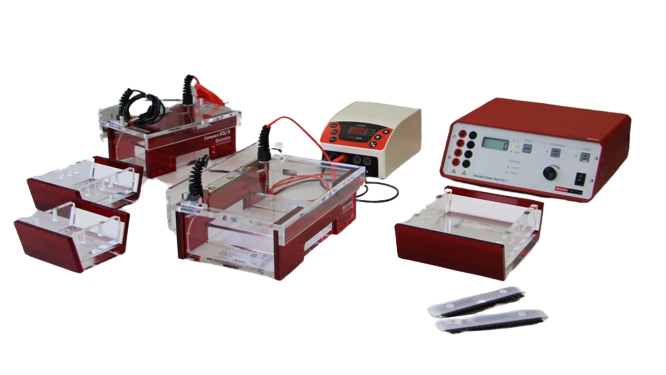Agarose Electrophoresis
Analytik Jena
Agarose gel electrophoresis is a technique used in molecular biology to separate DNA fragments of varying sizes ranging from 100 bp to 25 kb. The technique is relatively simple and straightforward to perform but possesses great resolving power. The agarose gel consists of microscopic pores that act as a molecular sieve that separates molecules based on the charge, size, and shape.
Here is a brief overview of the procedure:
- Preparation of Agarose gel matrix
- Sample preparation and loading
- Applying electric current and separating biomolecules
- Visualization
- The separation medium is a gel made from agarose, which is isolated from the seaweed genera Gelidium and Gracilaria and consists of repeated agarobiose (L- and D-galactose) subunits 1. During gelation, agarose polymers associate non-covalently and form a network of bundles whose pore sizes determine a gel’s molecular sieving properties. In general, the higher the concentration of agarose, the smaller the pore size.
- The DNA fragments are loaded into pre-cast wells in the gel and a current is applied. The phosphate backbone of the DNA molecule is negatively charged, therefore when placed in an electric field, DNA
CATEGORIES: Life Sciences
| Catalog Number | Product Name | Action |
|---|---|---|
| 846-025-299 | Compact M system: Compact M + gel casting system M (see 025 - 200 + 025 - 210) |
Agarose Electrophoresis
Analytik Jena
Agarose gel electrophoresis is a technique used in molecular biology to separate DNA fragments of varying sizes ranging from 100 bp to 25 kb. The technique is relatively simple and straightforward to perform but possesses great resolving power. The agarose gel consists of microscopic pores that act as a molecular sieve that separates molecules based on the charge, size, and shape.
Here is a brief overview of the procedure:
- Preparation of Agarose gel matrix
- Sample preparation and loading
- Applying electric current and separating biomolecules
- Visualization
- The separation medium is a gel made from agarose, which is isolated from the seaweed genera Gelidium and Gracilaria and consists of repeated agarobiose (L- and D-galactose) subunits 1. During gelation, agarose polymers associate non-covalently and form a network of bundles whose pore sizes determine a gel’s molecular sieving properties. In general, the higher the concentration of agarose, the smaller the pore size.
- The DNA fragments are loaded into pre-cast wells in the gel and a current is applied. The phosphate backbone of the DNA molecule is negatively charged, therefore when placed in an electric field, DNA
CATEGORIES: Life Sciences
| Catalog Number | Product Name |
|---|---|
| 846-025-299 | Compact M system: Compact M + gel casting system M (see 025 - 200 + 025 - 210) |


